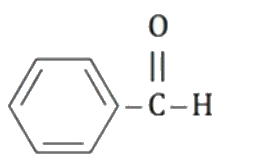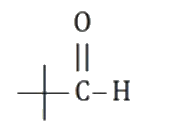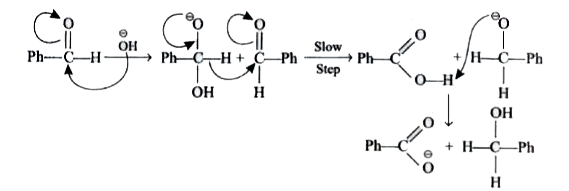Which of the following cannot give Cannizzaro reaction?


Cl−Cl∣C∣Cl−O∣∣C−H
H−O∣∣C−H
The correct Answer is:C
To determine which of the given compounds cannot undergo the Cannizzaro reaction, we first need to understand the conditions under which this reaction occurs.
1. Understanding Cannizzaro Reaction:
The Cannizzaro reaction involves aldehydes that do not have any alpha-hydrogens. In this reaction, one molecule of the aldehyde is oxidized to a carboxylic acid while another molecule is reduced to an alcohol.
2. Identifying Aldehydes:
We need to examine the given options to identify which aldehyde lacks alpha-hydrogens. Aldehydes that cannot undergo Cannizzaro reaction are those that have alpha-hydrogens or can undergo other reactions instead.
3. Analyzing Each Option:
- Option 1: Benzaldehyde (C6H5CHO):
- Benzaldehyde has no alpha-hydrogens. Therefore, it can undergo Cannizzaro reaction.
- Option 2: Acetaldehyde (CH3CHO):
- Acetaldehyde has alpha-hydrogens (the methyl group), hence it cannot undergo Cannizzaro reaction.
- Option 3: Chloral (CCl3CHO):
- Chloral does not have alpha-hydrogens, but it can undergo a different reaction (haloform reaction) due to the presence of the CCl3 group. Therefore, it cannot give Cannizzaro products.
- Option 4: Formaldehyde (HCHO):
- Formaldehyde has no alpha-hydrogens and can undergo Cannizzaro reaction.
4. Conclusion:
After analyzing all options, we find that Option 3 (Chloral) cannot give Cannizzaro reaction because it undergoes a haloform reaction instead.
Final Answer:
Chloral (CCl3CHO) cannot give Cannizzaro reaction.
---
The Cannizzaro reaction involves aldehydes that do not have any alpha-hydrogens. In this reaction, one molecule of the aldehyde is oxidized to a carboxylic acid while another molecule is reduced to an alcohol.
We need to examine the given options to identify which aldehyde lacks alpha-hydrogens. Aldehydes that cannot undergo Cannizzaro reaction are those that have alpha-hydrogens or can undergo other reactions instead.
- Option 1: Benzaldehyde (C6H5CHO):
- Benzaldehyde has no alpha-hydrogens. Therefore, it can undergo Cannizzaro reaction.
- Option 2: Acetaldehyde (CH3CHO):
- Acetaldehyde has alpha-hydrogens (the methyl group), hence it cannot undergo Cannizzaro reaction.
- Option 3: Chloral (CCl3CHO):
- Chloral does not have alpha-hydrogens, but it can undergo a different reaction (haloform reaction) due to the presence of the CCl3 group. Therefore, it cannot give Cannizzaro products.
- Option 4: Formaldehyde (HCHO):
- Formaldehyde has no alpha-hydrogens and can undergo Cannizzaro reaction.
After analyzing all options, we find that Option 3 (Chloral) cannot give Cannizzaro reaction because it undergoes a haloform reaction instead.
Chloral (CCl3CHO) cannot give Cannizzaro reaction.
Similar Questions
Knowledge Check
Which of the following do not give Cannizzaro reaction?
ACl3C−O∣∣C−HBH−C∣∣O−HCPh−C∣∣O−HD
When an aldehyde with no α- hydrogen react with concentrated aqueous NaOH half the aldehyde is converted to carboxylic acid salt and other half is converted to an alcohol. In other words, half the reaction is oxidized and other half is reduced. This reaction is known as Cannizzaro reaction.

Mechanism:

Which of the following will not give Cannizzaro reaction?A B
B CCl−Cl∣C∣Cl−O∣∣C−HDH−O∣∣C−H
CCl−Cl∣C∣Cl−O∣∣C−HDH−O∣∣C−HWhich of the following does not undergo Cannizzaro reaction?
ABenzaldehydeB2 - MethylpropanalCp - MethoxybenzaldehydeD2, 2 - Dimethylpropanal
Cannizzaro's reaction
View SolutionWhich of the following will show cannizzaro reaction :
View SolutionWhich of the following cannot give iodometric titrations?
View SolutionGive one example each of the following name reactions:
Cannizzaro's reaction
View SolutionWhich of the following cannot undergo E2 reaction?
View Solution
